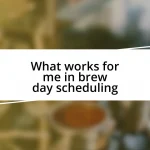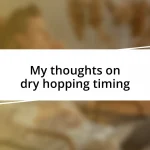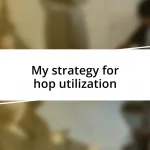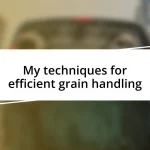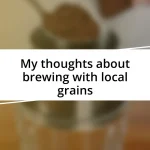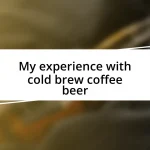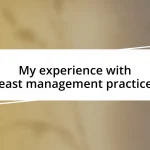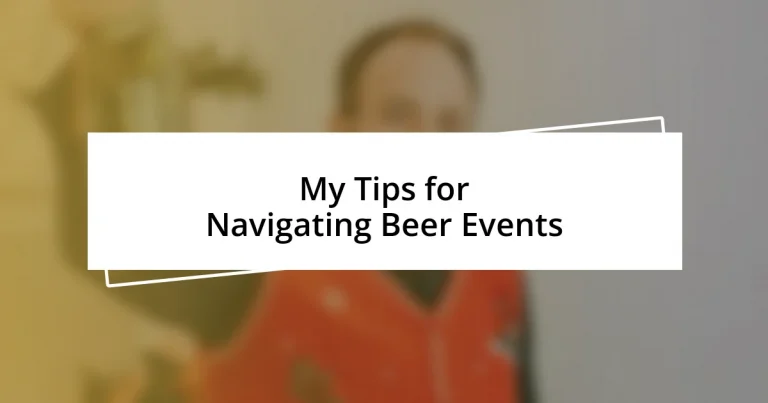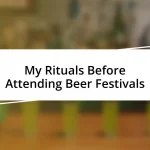Key takeaways:
- Beer events offer a unique blend of social interaction and educational opportunities, allowing participants to deepen their knowledge and appreciation for craft beer.
- Planning for beer events is essential; defining goals, mapping vendor visits, and budgeting enhance the overall experience and help avoid overwhelm.
- Networking at these events focuses on genuine conversations and shared experiences, which can lead to meaningful connections and ongoing discussions in the beer community.
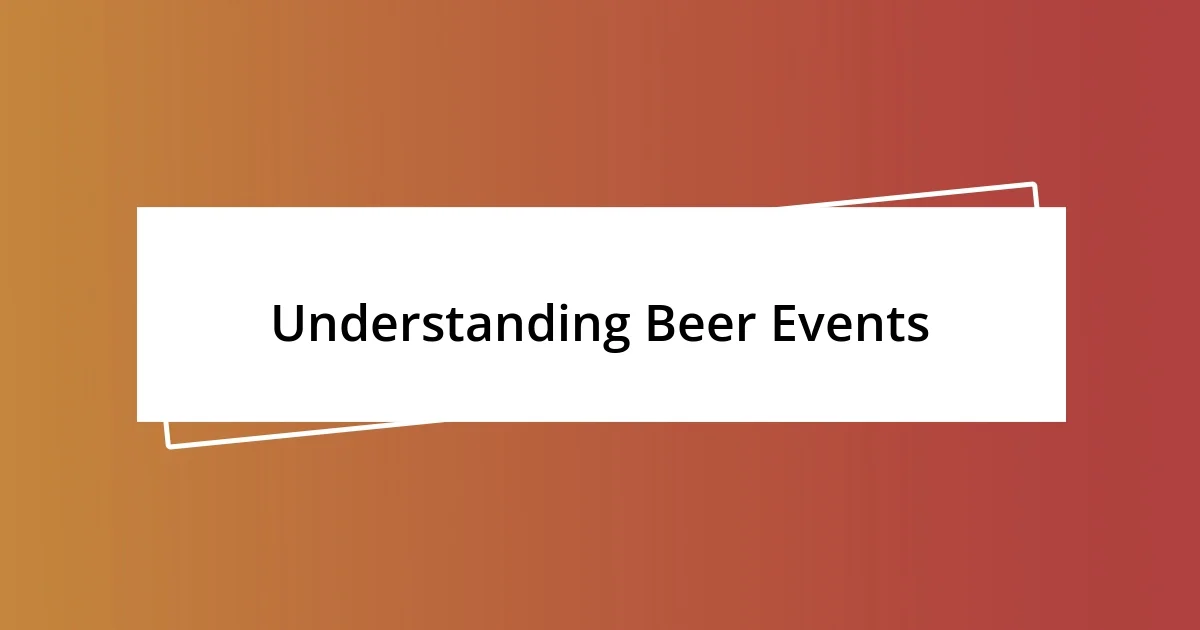
Understanding Beer Events
Beer events are much more than just opportunities to sample beverages; they’re vibrant experiences that celebrate the craft and culture behind brewing. I remember attending my first local beer festival, and the excitement in the air was palpable. People mingled, sharing stories and preferences, which made exploring new flavors feel like a communal adventure.
Understanding these events involves recognizing the diversity of participants. From passionate homebrewers eager to showcase their creations to seasoned professionals representing well-known breweries, each attendee contributes to a rich tapestry of knowledge and experience. Have you ever found yourself in a deep conversation with a brewer about the nuances of hop varieties? Those moments can create lasting connections and broaden your appreciation for the craft.
I’ve found that many beer events also incorporate educational elements, like tastings and workshops on brewing techniques. These are invaluable for anyone looking to deepen their understanding of beer. After attending a seminar on the science of fermentation, I realized how much there is to learn – and how enjoyable the journey can be. This combination of socializing and education is what makes beer events truly special, inviting all of us to participate in a shared love for craft beer.
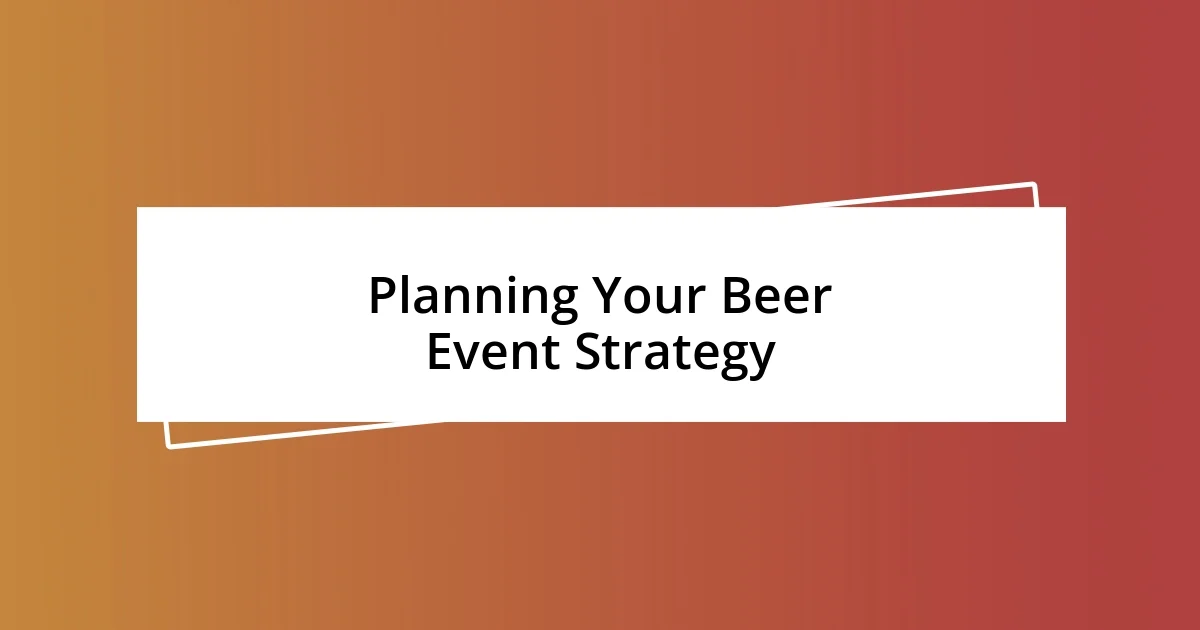
Planning Your Beer Event Strategy
When I think about planning a beer event strategy, I always start by considering my goals. Are you hoping to discover unique brews, network with industry professionals, or simply enjoy a fun day out with friends? Defining your objective helps narrow down which events will be worth your time. With so many options out there, a clear focus can steer your choices and elevate your experience.
Another key part of my strategy is to map out which breweries or vendors I want to visit ahead of time. I remember feeling overwhelmed at my first large festival, darting from stall to stall without a plan. Now, I take a little time to research participating breweries, checking out reviews and recommended brews. Creating a personal itinerary not only helps manage my time effectively but also ensures I don’t miss any hidden gems. Planning really pays off when you’re standing in front of a brewery whose offerings you’ve been eager to try.
Budgeting is crucial too. It’s easy to get caught up in the excitement and spend more than intended. I’ve learned to set a budget for tastings and merchandise before I arrive, which helps me prioritize what I really want. Adjusting my strategy over time, I’ve become more discerning, leaving room for a surprise splurge on a standout beer or a special event. This approach ultimately enhances the enjoyment and makes each experience memorable.
| Planning Aspect | My Strategy |
|---|---|
| Goals | Define clear objectives to shape your event choices. |
| Vendor Research | Create a personal itinerary from reputable sources. |
| Budgeting | Set a budget to prioritize tastings and surprises. |
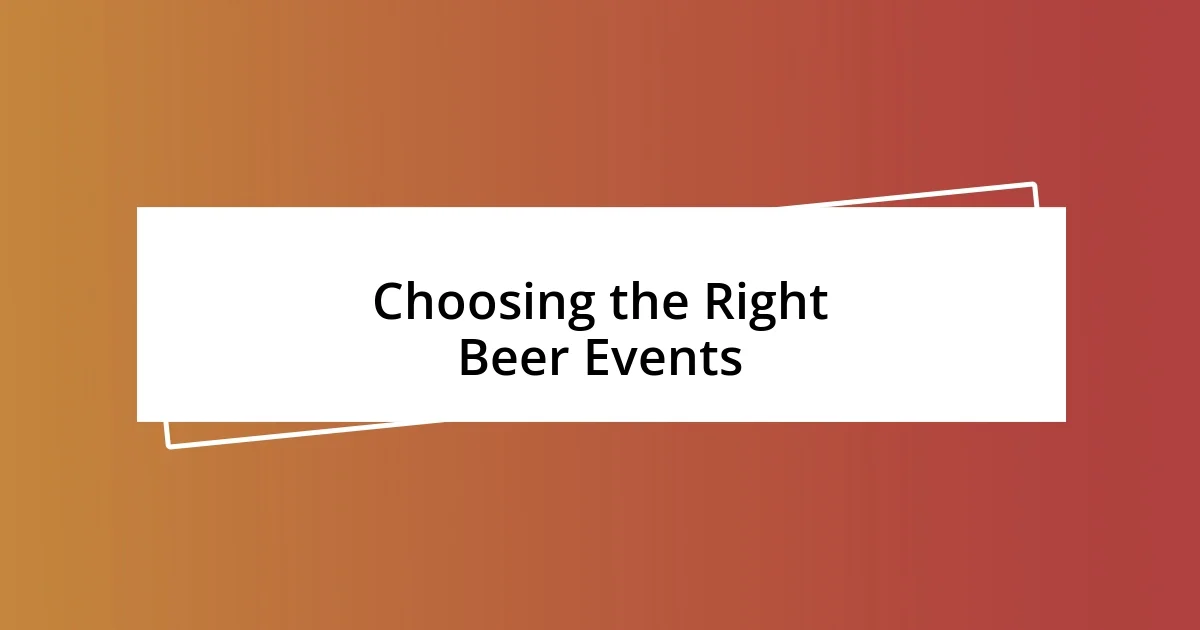
Choosing the Right Beer Events
Choosing the right beer events can transform your experience from average to unforgettable. I recall attending a small craft beer gathering where the brewers were incredibly approachable, allowing me to sample unique flavors while hearing their personal brewing stories. Events like these enable intimate connections with the beer community, making it easier to dive into the craft with knowledgeable enthusiasts.
When selecting events, consider these factors:
- Type of Event: Look for festivals, competitions, or educational tastings that align with your interests.
- Local vs. National: Local events often feature hidden gems, while larger festivals showcase widely recognized breweries.
- Focus: Some events highlight specific styles (like IPAs or stouts) or themes (such as sustainability), which can enhance your experience.
- Activities: Check for workshops, panel discussions, or guided tastings—these can provide invaluable insights.
- Reviews and Recommendations: Utilize social media or local beer groups to gather feedback from past attendees; personal recommendations can lead to discovering the best events.
Focusing on what excites you will ensure every visit feels meaningful and engaging.
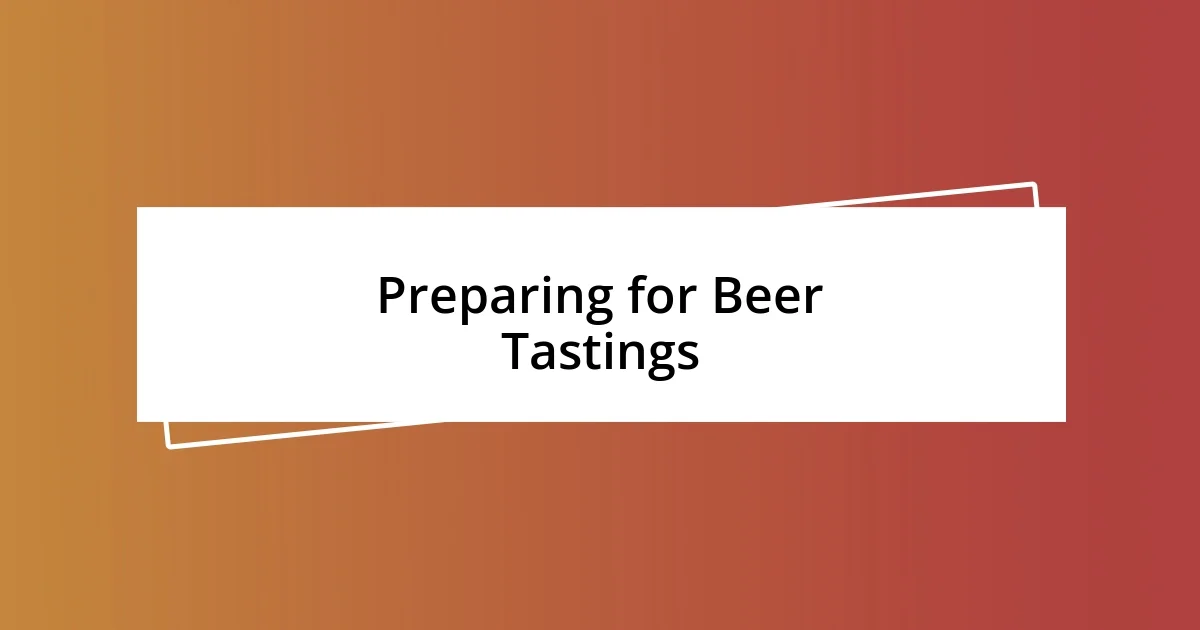
Preparing for Beer Tastings
Being well-prepared for beer tastings enhances the overall experience and makes it more enjoyable. I remember my first tasting—my excitement led me to skip meals, thinking I could just fill up on beer. Big mistake! Going in on an empty stomach not only hindered my appreciation for the flavors but also made the experience less enjoyable. Now, I always eat beforehand and consider packing some snacks for the event, ensuring I can savor every sip without feeling overwhelmed.
Hydration is another crucial aspect I can’t stress enough. I learned this the hard way after feeling sluggish during a festival. Keeping a water bottle handy helps me sip between tastings, allowing my palate to reset and keep me energized throughout the day. It’s surprising how much of a difference staying hydrated can make, both for your enjoyment of the beers and your overall well-being.
Lastly, I like to bring a notebook or my phone to jot down my thoughts on the beers I try. I’ve found that it’s easy to forget the nuances of each brew amidst the buzz of the event. By keeping track, I can better reflect on what I enjoyed most, and this practice has not only refined my taste but also turned each tasting into a delicious quest for deeper knowledge about beer. Exploring and documenting flavors feels like crafting my personal beer journey, which is incredibly fulfilling.
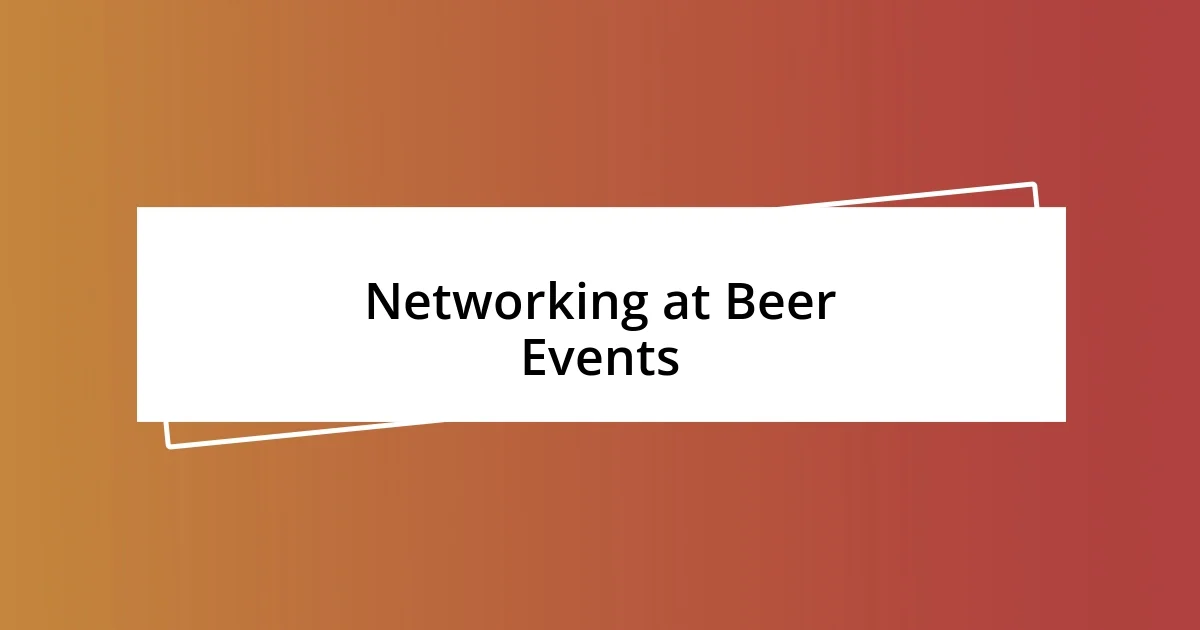
Networking at Beer Events
Building connections at beer events can be a surprisingly enriching experience. I remember attending a local craft beer festival where I struck up a conversation with a fellow enthusiast while waiting in line for a tasting. We ended up sharing our favorite breweries and even exchanged contact information to continue the discussion over a pint later. It’s moments like these that foster friendships and open doors to new experiences in the beer community.
Approaching networking at these events is about more than just swapping business cards. I’ve found that asking open-ended questions about someone’s favorite styles or experiences can lead to deeper conversations. For instance, I once asked a brewer about their inspiration for a particular beer, and the story behind it captivated me. It not only enriched my understanding of that brew but also strengthened my connection with the brewer—showing that genuine curiosity can go a long way.
Don’t underestimate the power of shared experiences when connecting with others. When I engage with fellow attendees over a unique tasting experience, there’s an instant camaraderie that makes networking feel effortless. Have you ever noticed how much easier it is to bond over a delicious brew? Embracing those collaborative moments can turn casual chats into lasting connections that enhance your overall beer journey.
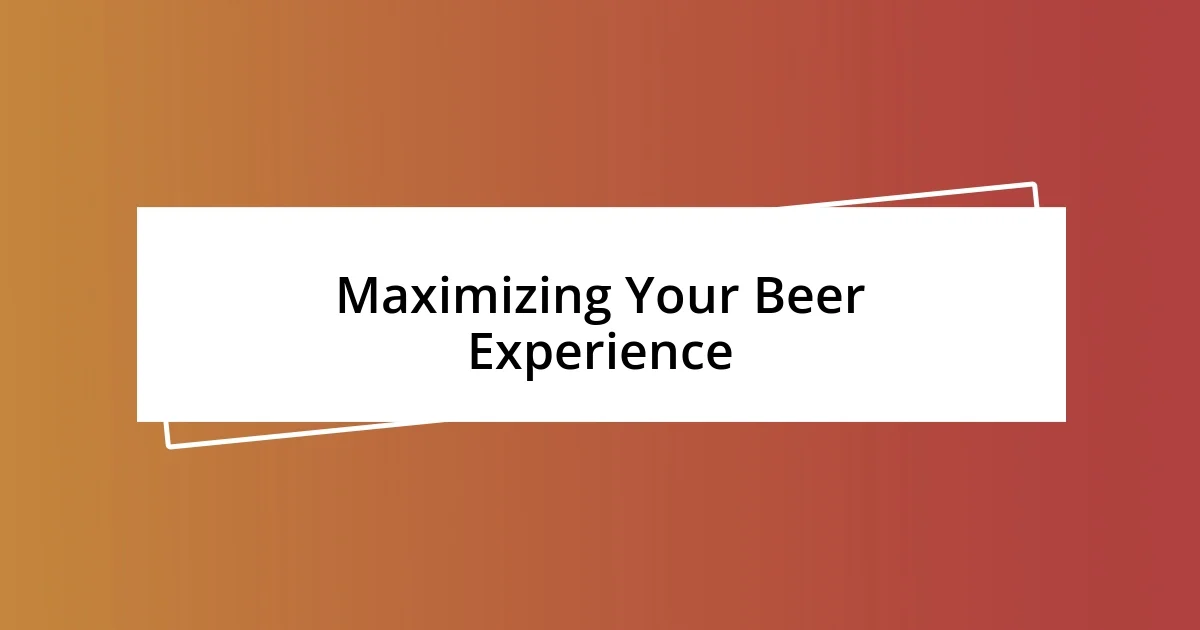
Maximizing Your Beer Experience
I make a concerted effort to embrace the whole experience during beer events, rather than just focusing on the tastings themselves. One time, I found myself lingering at a booth featuring a unique brewing method. The brewer was passionate and eager to share her process, which not only expanded my knowledge but also deepened my appreciation for the craft. Doesn’t it feel rewarding when you connect with someone who shares their expertise? It transforms a simple tasting into an educational journey.
Another tip is to be curious about the different styles of beer on display. I once attended an event with a wide array of international brews, and exploring those unique flavors was like a mini-vacation for my palate. I made a point to try styles I had never tasted before, like a rich, velvety imperial stout from Belgium. Expanding your horizons like this can be eye-opening and gives you great stories to share later—have you ever discovered a new favorite at an event?
Finally, immersing yourself in the event’s atmosphere is crucial. I remember the joy of solving the mystery of a beer’s flavor profile during a session. There I was, surrounded by laughter and chatter, swirling my glass and savoring the aroma. I’ve learned that actively engaging all my senses—and even striking up conversations with those who may have a different take—can truly elevate the experience. Isn’t it fascinating how beer can bring people together in such a vibrant way? Each sip can unlock a story or connection, enriching my journey in this delightful world.
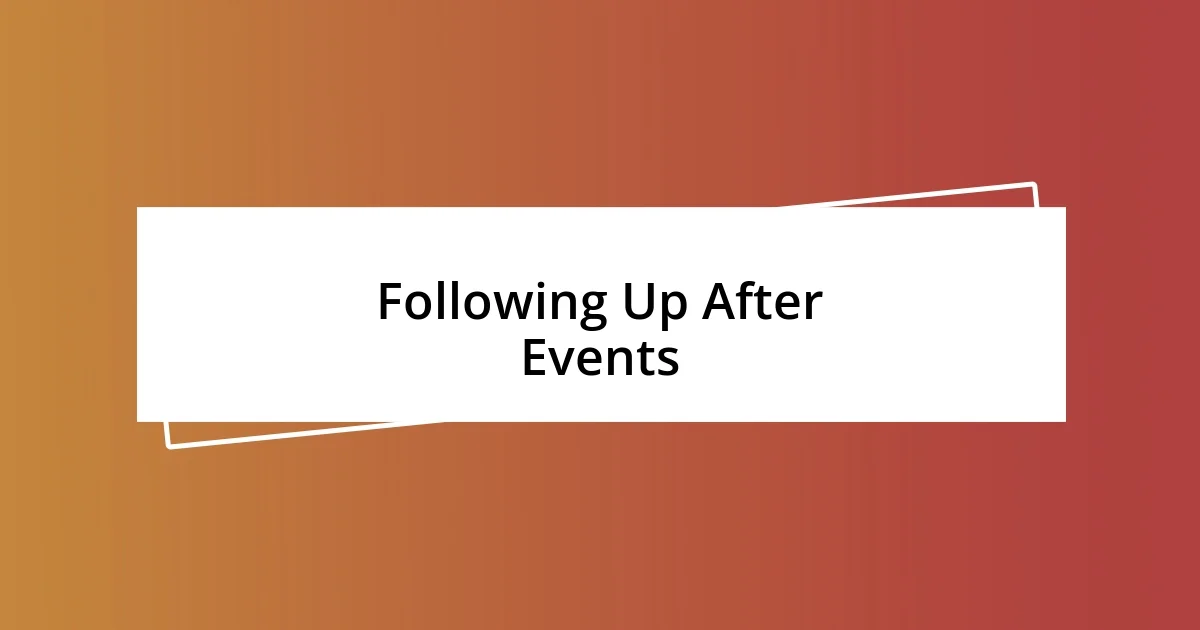
Following Up After Events
After a beer event, following up is essential to maintain those connections you’ve made. I once reached out to a brewer I met at a festival by sending a quick email, sharing how much I enjoyed their beer and inviting them for a tasting at a local pub. The response was positive, and we even brainstormed ideas for a collaborative brew. Doesn’t it feel great to turn a fleeting encounter into something more substantial?
I find that timing is key when it comes to follow-ups. I typically try to reach out within a week while the memories are still fresh. I’ve made it a habit to jot down any memorable details about people I meet during the event—like their favorite beer style or any inside jokes we shared—so I can reference them later. It shows that I value our conversation and helps rekindle the connection. Have you ever found that little details can transform a standard follow-up into a warm, personalized message?
Another strategy I’ve used is to share interesting articles or upcoming events that might align with the interests of the people I connected with. For example, I sent a link to a podcast episode discussing brewing techniques to a homebrewer I met. Not only did it provide value, but it also sparked another conversation, reinforcing our connection. This approach cultivates a sense of community while keeping the dialogue going. What could be better than nurturing relationships that revolve around a mutual passion for beer?
